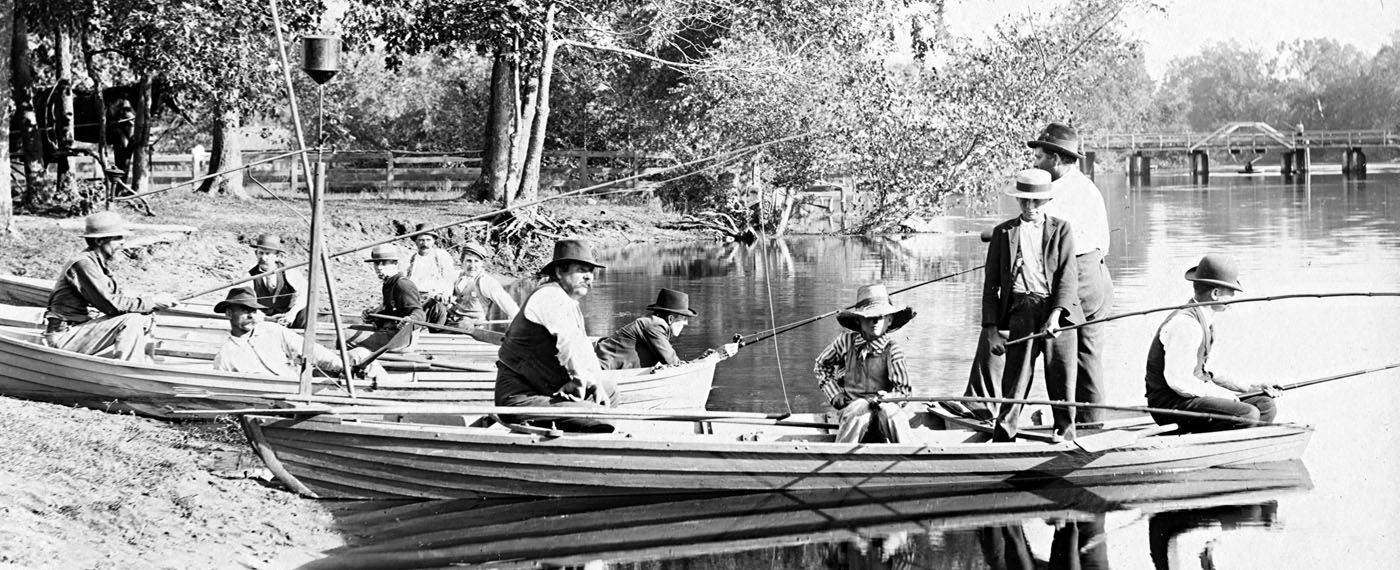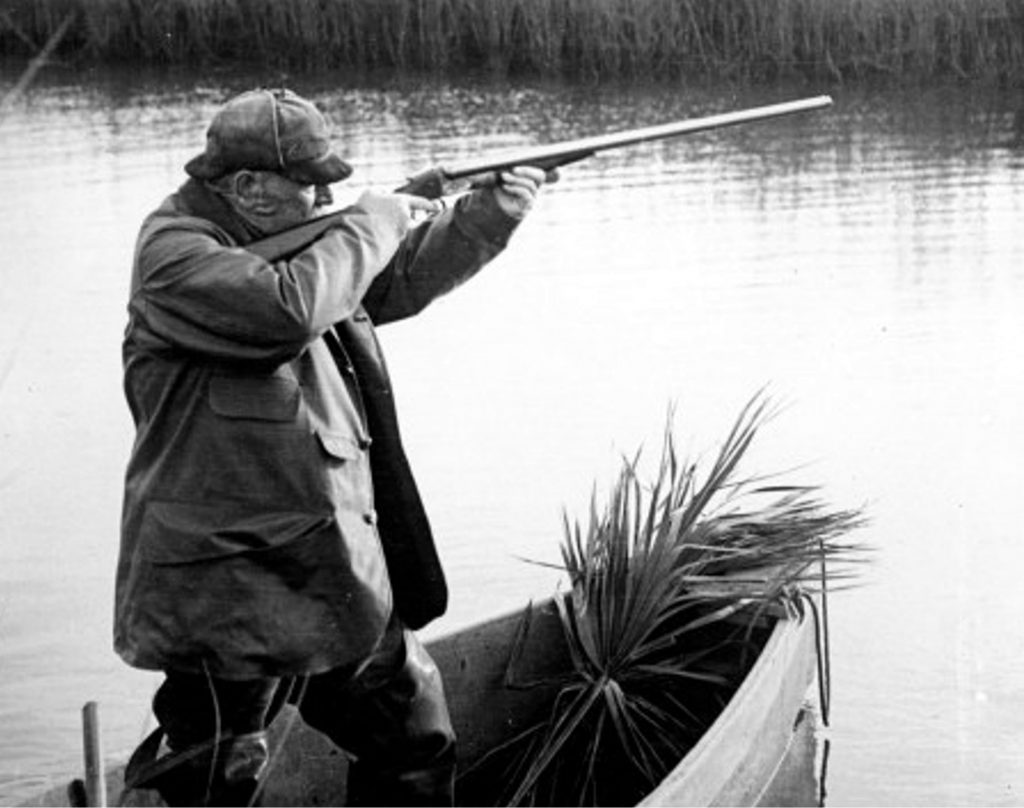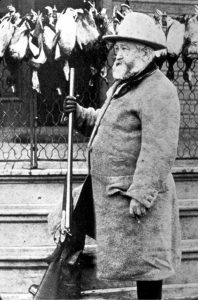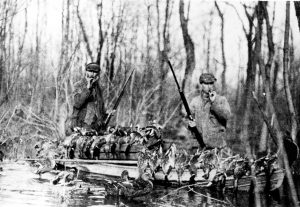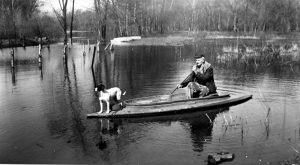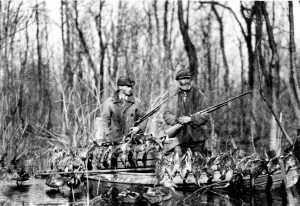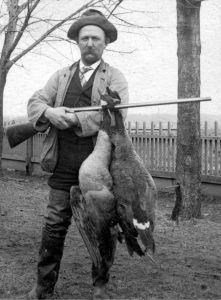Blue Cranes Over the Bayous
By Fay Folsom Nichols
Old Joe Crane flapped his wings as he came in in the teeth of a belated March blizzard. A beautiful blue-gray aigrette, her nuptial veil, fell from his mate as she flew beside him. Joe’s beak held straight on the course that had brought them up from the Louisiana bayous-following the Mississippi flyway, back to the old home on Red Oak Island.
Long, slender legs stretched gracefully behind as ballast to the softly feathered bodies. Borne back on the icy particles that filled the air came the delightful musical notes of a softly-toned brass trumpet. It was Old Joe’s “welcome home,” to his lady love.
“Bring ‘er over here, Allen, I’ve got a boat load.” Irwin raised his head above a reed blind, and cupping his lips with his hands, shouted to a man pushing a long, slender boat feelingly through shell ice that covered the marsh. Water was seeping up around the stems of dried cattails and wild rice. Great crackling noises echoed up and down the stream. “She’s goin’ out like a lion, all right, but this storm won’t last. Just saw Old Joe and his partner coming in. Sure sign spring is here!”
It was in 1869 when Ed Irwin, western New Yorker, first tasted the joys of hunting along the Kankakee. Ed had awakened on the morning of October 18, afflicted with a strange malady. Sometime during the night he had heard the cold rain pelting against his window, heard the rattle and rustle of maple leaves as the wind loosened them and swept them in clouds across the lawn. The striking of the hall clock roused him. It was still three hours until daylight, but the room seemed to glow, and he could see things in the strange light. A bed of rushes and bunches of wild rice, seared brown and dry, floated past. His bed seemed to have become a boat, and was actually rocking. Soft wings brushed his cheeks as a flock of mallards moved above him, the greens and purples of their feathers dazzling his eyes.
Irwin had duck fever. He knew the symptoms. He knew the cure. By daylight his hunting coat was off its peg on the back porch, and he was driving through a blinding snow storm-squaw winter-ten miles to board a train that would take him to Chicago. He was going duck hunting and somewhere within the marshy areas of that western city there must be quantities of ducks. A friend had recommended F. J. Abbey, gunsmith, established on South Clark Street, who, he was confident, could give him valuable information as to the best hunting locations.
True to recommendations, Mr. Abbey proved to be not only a competent gunsmith, whom Irwin trusted to rebore his muzzle-loader and furnish with new percussion caps, but a most congenial fellow as well. He would show Ed the sights.
Together they walked down South Water Street. Irwin could not believe his eyes. Commission houses lined both sides of the streets, and wagon loads of all kinds of wild game were piled upon the sidewalks in front of these houses. Hundreds of birds hung, suspended, from the awnings over the doors. Horse-drawn drays were constantly arriving from the Panhandle railroad station with fresh supplies, and hauling great loads away to waiting customers. Buyers from the city’s hotels and restaurants were haggling with commission merchants, carefully selecting their day’s needs. Such activity actually made the sportsman’s head swim. He had visions of something ahead, the like of which he had never experienced.
Irwin felt of a deer, one of many hanging head down in front of a commission house. He checked on wild turkeys, geese and brant, prairie chickens and teal. Surely, he was about to enter the hunter’s paradise. He might be going into a strange land, but he’d be no stranger when he got therel Ed was a naturalist of the old school. The deeper the wood, the trickier the stream, the better he liked it.
The two men entered the house of Joyce and Cunningham, and asked the manager to recommend a good place to go for duck hunting.
“Out to Hebron, Indiana, on the Panhandle about fifty miles from the city,” Joyce advised. “There is the greatest duck and goose hunting I know of.” He handed the New Yorker a bunch of tags. “If you have anything to sell while there, ship to us and we will guarantee quick and satisfactory returns.”
The outlook for one grand vacation loomed rosy and promising. Back at Mr. Abbey’s store, Irwin purchased a twenty-five pound sack of No. 6 shot; a six and one-quarter keg of powder; one thousand Ely’s felt wads and one thousand Ely’s water-proof percussion caps. This, he considered, just a starter, but Mr. Abbey promised to ship him anything he might want after he was located.
Then with true western hospitality, the gunsmith showed Irwin to the railroad station-the Union Depot.
Those were the days when the railroads really accommodated the small towns. They were out after business, and got it. Hebron had less than five hundred inhabitants, but there were two passenger trains daily into Chicago and three out. So, Irwin left the city at nine P.M. and was in Hebron at eleven.
Yellow lamplight, creeping through grimy windows, lighted a small patch of ground in front of the depot. The darkness beyond was thick and impenetrable. A few straggling passengers waded knowingly into it. The station agent’s lantern flickered unevenly about the baggage truck as he wrestled incoming express. Irwin stood around until he was through, waiting for a word.
“Name’s Scott! L. P.!” said the genial agent once he had the truck safely locked in the baggage room. “Lookin” for a place for the night, stranger?” He had noted the hunting equipment.
Irwin said that he was and followed Scott and his bobbing lantern across the street to the two-story frame hotel.
From his hotel room the next morning, Irwin looked down upon the station platform. The sight held him spellbound. Dressing hurriedly he went over. A huge quantity of game was being tagged for shipment to Chicago. He began reading the tags: five deer, four hundred and sixty-seven ducks (large); three hundred and ninety-two ducks (small); twenty-two geese; sixteen brant; Beaubein and Sargent, Hebron, Indiana, to Joyce and Cunningham, Chicago.
“Their tri-weekly shipment,” explained Scott, busily pasting labels.
There was just enough crispness in the air to make walking a pleasure, though he went along under the burden of hunting paraphernalia. The red and the golds of the maples showered him as he entered the marshlands. Beechnut leaves crackled like peanut shells underfoot. The upland hickories were pure gold. Cardinals were seeking shelter among the sumac, scarcely distinguishable from the red of their leaves. Blue birds and wild canaries brought in clouds of color as they came in great droves apparently gathering for the fall flight south. Such was October on the Kankakee, and in his last years, when deprived of his eyesight, Irwin had this first glimpse of the great swampland to remember.
It was noon when the hunter reached the cabin of Hank Granger, one of the best known of the river-men. After a belated dinner, Granger and Irwin were off to Granger’s camp on Indian Gardens.
They began to see ducks as soon as they had shoved off down the river-mallards in the edge of the timber, and open water ducks in the channel. Irwin anxiously fingered his gun, as several deer, startled by the movement of their boat in the water, ran back into the timber. Granger advised against shooting. Because of the lateness of the day there would be no time to stop and pick up the kill if they were to reach camp before nightfall.
It was dusk when they landed on the island where not only was Granger’s camp, but Beaubein and Sargent’s as well. These two men were just coming in, their boats loaded with ducks and geese. Irwin gasped at the unbelievable sight.
By morning a northeast gale was blowing, whipping the tree tops that surrounded the open marsh. Ducks and geese were pouring in from all sides. It was choice shooting, and the men chose geese and brants, only. Beaubein and Sargent, each to a boat, pushed ahead and located. Granger unloaded Irwin from his boat upon a muskrat house and moved on some seventy-five yards. At this instant a large flock of brant came pouring over the tree tops. Granger gave them both barrels, and seven fell.
Irwin fired. Then something happened. The pound and a quarter of powder in the extra flask had exploded. The wind pressing down over the tree tops had driven the fire from the gun down into the box and ignited the powder. It blew everything out of the boat except the shot, and that was burning. It blew the planking loose from the bow of the boat and spread it out flat like a raft. The entire inside of the boat was covered with a blue smut-like paint. The explosion deafened them.
Granger, with great presence of mind, pushed the bow of the boat into the bushes, thus keeping it from sinking. At this strategic moment Doc Rice, a familiar riverman, appeared around the bend.
His ammunition gone, Irwin’s hunting on this particular trip was over. Rice took the men in his boat. They trailed Granger’s boat back to camp for repairs, and Rice took Irwin back to the landing where he returned to the Granger home.
Eagle Creek ran close to the Grangers, and near-by ponds were numerous. The creek ran in a straight line for three miles and emptied into the Grand Marsh. It was sixteen feet wide and many places were shallow enough to wade across. In this area, Irwin completed his fall hunting, bagging enough duck to satisfy any hunter.
Coon hunting was good, and Irwin sent back to New York for his coon dog, a large handsome hound afraid of neither man nor beast. In due time the dog arrived. He came with a strong collar and chain, and Irwin tied him in the barn. On going out with his supper a few nights later he discovered the dog was gone.
“Think I saw your dog in a boat with a fellow, going up the river as I came down this afternoon,” said Fox, a fur buyer who had stopped with the Grangers for the night. “My boatman asked the fellow where he got the dog, and he replied that he had found him. Said he was going to spend the night at Grape Island.”
“I’ll be at Grape Island before morning,” retorted Irwin. It was four miles to the Hebron Canal by road and twelve miles by river to Grape Island. When he reached the canal there were several boats but no paddles. Finally he found a piece of one-a blade and about six inches of handle. With this he put a boat in the canal and started for the river. Coming out into the main stream he looked for a landmark to use as he returned. He noticed a large oak tree with limbs hanging straight out like a man’s arms. Then he struck out down the river, having all he could do to manage the boat in the swift current. In a former trip with Granger, he had been shown the Island.
It was a still, cold, starlight night. Mallard ducks were constantly flying up on each side of the river. He startled several deer. He made good time, going with the current, and almost before he realized it, he spotted the frost-covered roof of the cabin on the island. Turning his boat into a bayou he approached the shore. When within a few feet of land his boat ran into thin ice that had formed since dark. It made a crashing noise on the still night air. The next minute he heard his dog bark. He called him by name. The massive dog broke down the shanty door, and plunging into the water, swam to the boat. Irwin pulled him in and swung his boat out into the stream.
It was a difficult matter, going back up stream against the swift current. Irwin’s hands were soon blistered and bleeding from working the short paddle. His knees were sore from kneeling in the bottom of the boat. It was daybreak when he spotted his landmark, the old oak tree. The canal was frozen and as there was no going up it, he beached his boat, and with the dog walked the long miles back to Granger’s, arriving just as the family was sitting down to breakfast.
On the twentieth of December came the first snowfall of the season. An osage hedge back of the Granger’s was covered with prairie chickens taking shelter from the storm. Irwin bagged as many as he cared to and decided that with everything frozen tight, the hunting was over, and he would return to New York. He arrived in time to have the chickens roasted for the Christmas dinner.
A sample was proof of the pudding. In March Irwin was back on the Kankakee. During his visit the previous fall he had made many friends and on this trip he was a guest of Uncle Had Folsom at his Red Oak camp. Hunting was beyond all his anticipations. The early March days he had gone up and down the river with Uncle George Allen, bagging game to his heart’s content. He had taken a special interest in Old Joe’s nest building, and the nuptial veil of Joe’s lady-love was carefully pressed between the pages of a newspaper to be taken back as an adornment for Mrs. Irwin’s Easter bonnet. He went back to New York to spend long hours bent over huge ledgers in the county clerk’s office at Mayville.
But each fall the terrible fever returned to burn within his soul until he could return again and listen to the echo of his gun across the marsh.
His last visit, like his first, was made in October. It had been a hot, dry fall with very low water, and what ducks were left had gone back into the heart of the swamp. He had been staying with Folsom, Allen and Brainard at Red Oak, and his visit was in its last week. In the morning he would leave for home. He must have one last good bagging of ducks.
He remembered going from Hog Marsh down through a long cut-off the previous spring, and passing three open pools in the timber. Now this seemed his best chance. So with Brainard’s light boat, his gun and one hundred loaded shells, he found himself in a short while at the upper end of the cut-off. As he had expected it was nearly dry. He waded, dragging the boat behind him, through the first two pools. When the water began to grow deeper, he was again able to stand in the boat and push with the paddle toward the next pool.
When within about seventy-five yards of the pond, with a mighty rush and roar, more than a thousand mallards rose in the air. And still they came. Out of the pond and out of the timber on all sides. He did not attempt to shoot, but stood quiet until the last bird disappeared. Then he shoved into the pond as fast as he could. On the opposite side he noticed a grape vine hanging from trees overhead almost to the very water’s edge. He pushed the boat through under. this and turned about facing the pool. The boat was anchored firmly, and sitting astride of the stern with his feet resting on the bottom, he placed his open box of shells in front of him. Then taking his knife he trimmed an opening in the vines just large enough to shoot through. He was strategically set, ready for action and results.
The ducks began to return in small bunches. He knew everyone would be back within an hour, so he worked fast. They took a short circle before relighting, and he would kill the two that came in line with the first barrel. When his gun barrels became too hot to hold, he would dip them in the water. Irwin knew he had been in some close corners before, but never anything as fast as this.
He could not reload quick enough. His three hundred shells were gone before he realized it. Pulling the boat back into the pool, he commenced gathering up the birds. All of them had been killed within a distance of thirty-five yards, and every bird lay just where it struck the water.
When the job was completed he had twenty-two bunches of six each, and one bunch of four, making one hundred and thirty-six ducks. This the little boat would not carry, so he drew half of the kill to the lower end of the pool and hung them up among the willows. In the meantime the water had come in and he found it deep enough to get his boat through without wading.
“Pretty good for your last day here, Ed,” said Allen as he met Irwin at the landing and helped carry the ducks up the bank. “But Had has you beat. He brought in eighty-nine.”
“I have another boat load,” Irwin retorted, “which I will go back and get.”
Allen took his larger boat and returned to the pool with him.
By late afternoon Folsom became apprehensive of the weather.
“Take my boat, Brainard,” he said as he scanned the fast moving clouds, “and go up the river with Irwin’s mallards tonight. By morning the channel may be so full of ice we can’t cut through. Get word to the boys to come to the landing with a team and wagon and have these ducks home by morning.”
Allen and Irwin set in to help Uncle Harl cut underbrush which they used to pack about the cabin to keep out the threatened cold. They wrapped the iron pump with gunny sacks and wild hay. By dark everything was as snug as they could make it.
“Ed, you’ve made the greatest record I have ever known since I owned this camp,” remarked Folsom as the three men gathered around the supper table, stowing away cook Seymour’s hot biscuits.
“Only a fortunate combination of circumstances,” replied Irwin, “but I am much pleased and never expect to repeat my record.”
He never did. The blizzard struck about one o’clock and roared through the trees until morning. Soon it became too cold to snow. By daylight everything was frozen tight except the main channel, and even that was dangerous with shell ice.
After an early breakfast Irwin bid goodby to Red Oak Camp. He did not know it then, but the farewell was to be forever. He was destined never to return to the hunting grounds he had learned to love. But always he held inside of him the vivid memory of his last day on the Great Marsh.

